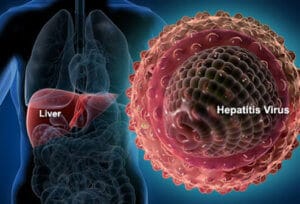Hepatitis B is a serious liver disease caused by the hepatitis B virus (HBV). The virus spreads primarily through sexual contact or sharing needles, but it can also be spread through normal household contact with HBV-infected people, or passed from by infected mother to her newborn baby.
In 2015, Hepatitis B resulted in 887,000 deaths.
Hepatitis B assaults the liver, causing scarring of the liver (cirrhosis), liver failure, and cancer. But most people don’t experience any symptoms while they have the disease.
The only way to know for sure if you have Hepatitis B is to get Tested.
What are the Symptoms of Hepatitis B?
The first symptoms may not show up until 1 to 6 months after you catch the virus. When they do, they may include:
- Jaundice. (Your skin or the whites of the eyes turn yellow, and your pee turns brown or orange.)
- Light-colored poop
- Fever
- Fatigue that persists for weeks or months
- Stomach trouble like loss of appetite, nausea, and vomiting
- Belly pain
But 30% of infected people experience no symptoms. The only way to know for sure is to get tested.
The likelihood that infection becomes deadly depends upon the age at which a person becomes infected.
Children less than 6 years of age who become infected with the hepatitis B virus are the most likely to develop chronic infections.
In infants and children:
- 80–90% of infants infected during the first year of life develop chronic infections; and
- 30–50% of children infected before the age of 6 years develop chronic infections.
In adults:
- less than 5% of otherwise healthy persons who are infected as adults will develop chronic infection; and
- 20–30% of adults who are chronically infected will develop cirrhosis and/or liver cancer.
A person of any age, sex, race, or sexual orientation can get infected with Hepatitis B. There are several primary ways the disease spreads to others:
- Having Unprotected Vaginal, Anal, or Oral Sex.
- Contact with your blood or an open sore.
- Sharing needles or syringes.
- An infected mother can give it to her baby during childbirth.
More rarely, Hepatitis B is transmitted via:
- Saliva, menstrual, vaginal, and seminal fluids.
- By getting a body piercing or tattoo at a place with poor sanitation practices.
- Using a toothbrush or razor with a tiny amount of infected blood on it (even if you can’t see it).
- Normal household contact.
You don’t have to have visible symptoms to transmit the disease. Many times, a person who doesn’t know they are infected is responsible for infecting others.
Correct use of a condom will reduce the risk of contacting Hepatitis B, but it won’t eliminate it.
The surest way to avoid transmission of Hepatitis B is to abstain from sexual contact, or to be in a long-term mutually monogamous relationship with a partner who has been tested and is known to be uninfected. If you are already infected, do not donate blood, plasma, body organs, tissue, or sperm, and tell anyone working in close proximity to you that you have it.
HSV infections can cause major complications for infants born to mothers with the virus. Infants who become infected might not have any symptoms right away, but are much more likely to become chronic carriers than other children or adults.
Chronic carriers may spread the virus throughout their lives, and the disease is transmitted so easily children can’t even share things like toothbrushes.
No, but there are preventative measures and steps that can be taken for each stage of the virus.
First, a Hepatitis B vaccine has been approved for many years. The vaccination series is usually given as three doses over a six-month period, has a 95% effective rate and lasts at least 20 years, and probably for life. If you have not had this vaccine or are unsure, ask your doctor.
If you do catch Hepatitis B, there is no cure. However, for the first stage of the infection that occurs within 6 months of catching the virus, 90-95% of adults are able to fight it off, and there are medications to help. They then become immune and cannot catch it again. For children, especially children under 6, the chance they will not be able to beat the virus increases dramatically.
When the body is not able to fight off the virus, Hepatitis B becomes chronic and sticks around for life. But there are a number of medications that significantly decrease the risk of liver damage by slowing down or even stopping the virus from reproducing. There are a small number of adults who are able to eventually eradicate the virus even in the chronic stage.
Hepatitis B Test
$99.00Add to cart
The Hepatitis B Surface Antigen test is a blood test used to detect the hepatitis b virus. This test is the earliest indicator of the presence of acute infection. It is also indicative of chronic infection. In other words, the surface antigen test will detect an active infection, whether acute or chronic. The earliest this test should be taken is 6 weeks after a possible exposure.




